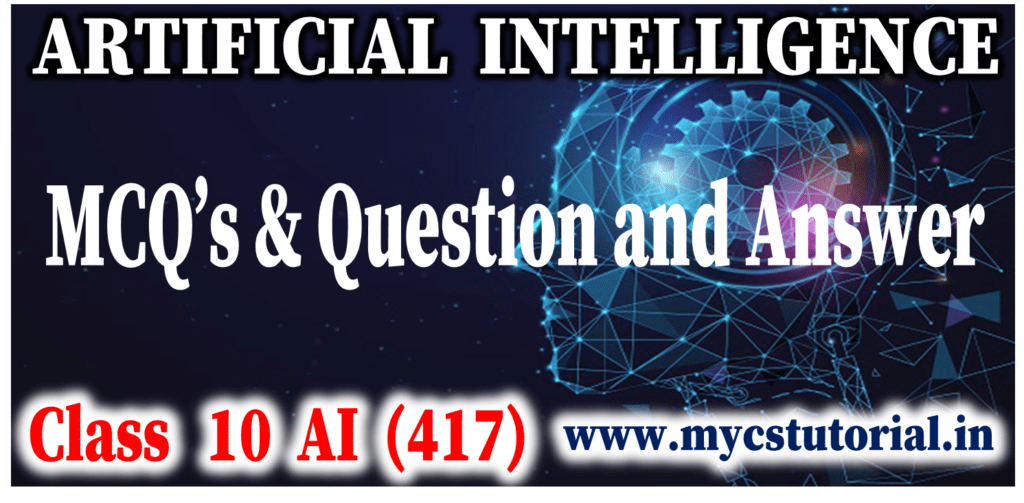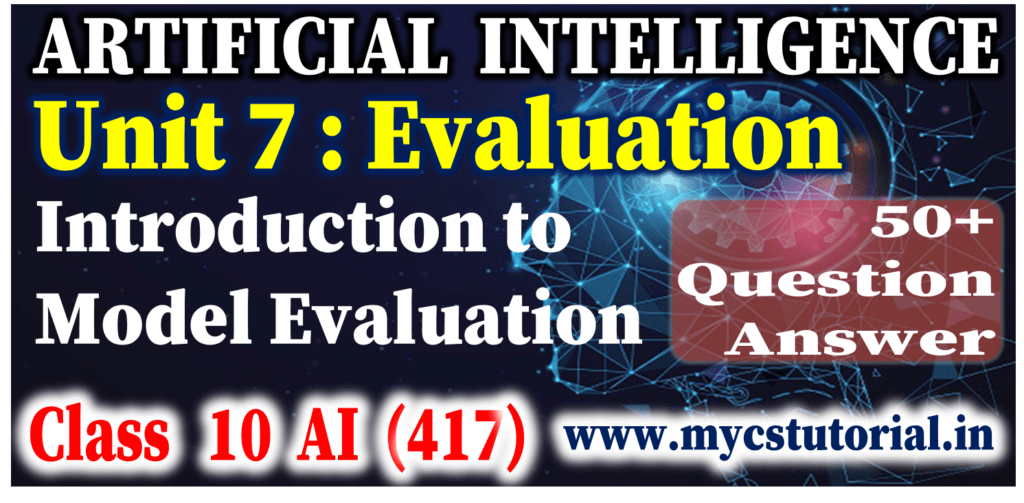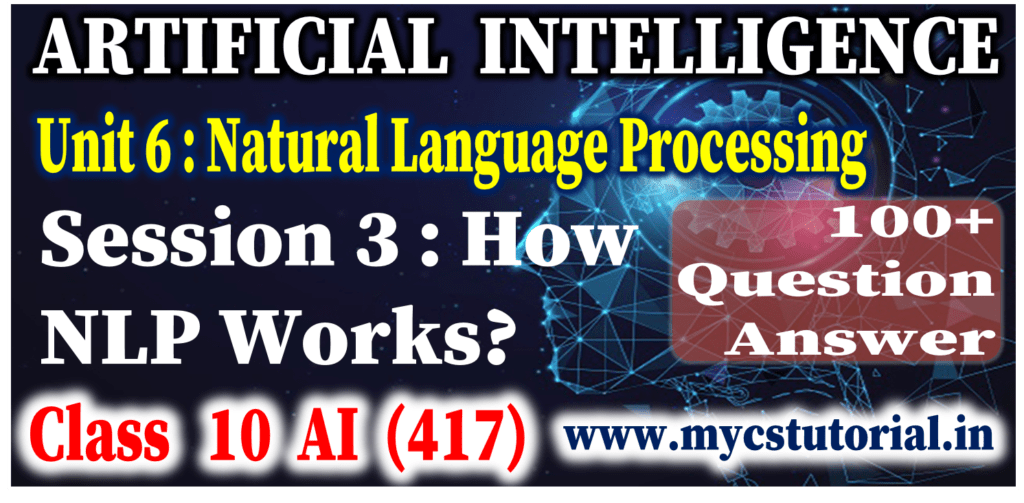UNIT 1: INTRODUCTION TO ARTIFICIAL INTELLIGENCE
Session 1: Foundational Concepts of Artificial Intelligence
Multiple Choice Questions Question Answers – 1 Mark
1. To make decisions, _________ is necessary.
(a) Information (b) Intelligence (c) Both a and b (d) Programming
Answer: (b) Intelligence
2. What stimulates us to initiate the process of reasoning?
(a) Process (b) Sensing (c) Reasoning (d) Programming
Answer: (b) Sensing
3. The processing of what we sense is called ______?
(a) Process (b) Sensing (c) Reasoning (d) Programming
Answer: (c) Reasoning
4. A man-made thing is called _______?
(a) Artificial (b) Ready Made (c) Intelligence (d) Artificial Intelligence
Answer: (a) Artificial.
5. To be able to learn different languages ________ intelligence is required.
(a) Spatial visual (b) Existential (c) Linguistic (d) Naturalist
Answer: (c) Linguistic
6. To be able to interact and related with the surroundings and environment is _______ intelligence
(a) Naturalist (b) Climate (c) Intrapersonal (d) None
Answer: (c) Naturalist
7. Ability to understand the logic, theories, formulae, and expressions is _______ intelligence.
(a) Naturalist (b) Climate (c) Intrapersonal (d) Mathematical and Logical
Answer: (d) Mathematical and Logical
8. Communicating with others with an understanding of ow they feel and perceive is _______ intelligence
(a) Interpersonal (b) Intrapersonal (c) Existential (d) Mathematical and Logical
Answer: (a) Interpersonal
9. Amrit has the ability to create, identify and understand rhymes and patterns. He is having _______ intelligence
(a) Naturalist (b) Climate (c) Intrapersonal (d) Musical
Answer: (d) Musical
10. Intelligence is directly related to ______.
(a) Fact (b) Learning (c) Brain (d) None
Answer: (b) Learning
11. Intelligence can be defined as ______.
(a) Ability to interact with the real-world
(b) Reasoning and Planning
(c) Learning and adaptation
(d) All of the above
Answer: (d) All of the above
Question Answers – 1 Mark & 2 Marks.
1. What is Artificial? (1 Mark)
Answer: Artificial is something that is man-made, which does not occur naturally.
2. What is Intelligence? (1 Mark)
Answer: Intelligence is the ‘ability to perceive or infer information, and to retain it as knowledge to be applied towards adaptive behaviours within an environment or context.’
Intelligence is the ability to observe and understand information, and preserve it as knowledge to apply in various situations or context through suitable adaptive behaviours.
3. What simulates us initiating the process of reasoning? (1 Mark)
Answer: Sensing
4. What is reasoning? (1 Mark)
Answer: The process of sensing (i.e. input – through sense, perceive, receive ) is known as reasoning.
5. How many types of reasoning? (1 Mark)
Answer: There are two types of reasoning – Deductive and Inductive
6. Define:- Deductive and Inductive? (2 Marks)
Answer: Deductive: In deductive reasoning facts are analysed and guarantee a conclusion.
Inductive: In inductive reasoning, facts only support the conclusion without any guarantee.
7. By which organ a human can sense? (1 Mark)
Answer: A human can sense through receptive organs (eye, ear, nose, mouse, skin, etc).
8. How a machine can sense? (1 Mark)
Answer: Machine can sense through the following sensing devices –
Image scanner, Audio sensor, Speech recognition engine, Biometric sensor, motion sensor, thermal sensor, light sensor, Proximity (distance) sensor, etc.
9. What are the different traits/characteristics/types of intelligence? (2 Marks)
Answer: The abilities/traits that are involved in intelligence are: –
- Natural Intelligence
- Interpersonal Intelligence
- Intrapersonal Intelligence
- Musical Intelligence
- Mathematical Logical Reasoning Intelligence
- Linguistics Intelligence
- Spatial Visual Intelligence
- Kinaesthetic Intelligence
- Existential Intelligence
10. What is Mathematical Logical Reasoning intelligence? (1 Mark)
Answer: A person’s ability to regulate, measure, and understand numerical symbols, abstraction, and logic, known as Mathematical Logical Reasoning.
Mathematical Logical Reasoning are carried out in the left, back and front of the brains.
11. What is Linguistic intelligence? (1 Mark)
Answer: Linguistic Intelligence means language processing skills both in terms of understanding or implementation in writing or verbally.
12. What is Spatial Visual intelligence? (1 Mark)
Answer: Spatial Visual intelligence is the ability to perceive the visual world and the relationship of one object to another.
13. What is Kineasthetic intelligence? (1 Mark)
Answer: Kinaesthetic Intelligence is the ability that is related to how a person uses his limbs in a skilled
manner.
14. What is Musical intelligence? (1 Mark)
Answer: Musical Intelligence is about a person’s ability to recognize and create sounds, rhythms, and sound patterns
15. What is Intrapersonal intelligence? (1 Mark)
Answer: Intrapersonal Intelligence describes how high the level of self-awareness someone has. Starting from realizing weakness, and strength, to his own feelings
16. What is Interpersonal intelligence? (1 Mark)
Answer: Interpersonal Intelligence is the ability to communicate with others by understanding other people’s feelings & influence the person.
17. What is Existential intelligence? (1 Mark)
Answer: Existential Intelligence is an additional category of intelligence relating to religious and spiritual awareness.
18. What is Naturalist intelligence? (1 Mark)
Answer: Naturalist Intelligence is an additional category of intelligence relating to the ability to process the information of the environment around us.
19. What is the difference between Interpersonal intelligence and Intrapersonal Intelligence? (1 Mark)
Answer: Interpersonal Intelligence involves interpersonal skills, communication skills, and ability to interact with others, while Intrapersonal intelligence involves the skills of self-awareness, self-discipline, self-management, self-evaluation, etc.
20. What is AI? (1 Mark)
Answer: AI is the science and engineering of making Intelligent machines.
21. What do you mean by AI? (1 Mark)
Answer: AI refers to the study of principles, concepts and technology for building such machines and systems that should think, act and learn like humans.
22. What are the AI challenges to making machine intelligence? (2 Marks)
Answer: AI challenges are
- Retain the facts as knowledge
- Recall the knowledge in a situation.
- Think, analyse and apply logic.
- Make useful and accurate predictions.
- Make decisions and upgrade their intelligence algorithm themselves.
23. How do machines become artificially intelligent? (1 Mark)
Answer: Machine becomes intelligent once they are trained with some information that helps them achieve their tasks.
AI machines also keep updating their knowledge to optimise their output.
24. What is the most important part of intelligence? (1 Mark)
Answer: Decision Making
25. What is decision-making? (1 Mark)
Answer: Decision-making is the capability that helps in taking the right decisions in different situations.
The basis of decision-making depends upon the availability of information and how we experience and understand it.
26. You are locked inside a room with 3 doors to move out of the locked room and you need to find a safe door to get your way out. (2 Mark)
- Behind the 1st door is a lake with a deadly shark.
- The 2nd door has a mad psychopath ready to kill with a weapon and
- The third one has a lion that has not eaten since the last 2 months.?
Answer: Gate number 3.
The reason being that since the lion has not eaten for 2 months, he wouldn’t have survived till now and would already be dead.
27. What is Artificial intelligence? (1 Mark)
Answer: When a machine possesses the ability to mimic human traits, i.e., make decisions, predict the future, learn and improve on its own, it is said to have artificial intelligence.
OR
A machine is artificially intelligent when it can accomplish tasks by itself – collect data, understand it, analyze it, learn from it, and improve it.
28. Write the name of Applications of Artificial Intelligence around us? (2 Marks)
Answer: Articificially Intelligence applications are-
(a) Google Assitant (b) Auto Suggest and auto-corrects (c) Cortana (d) Siri (e) Google Maps (f) Weather forecast (g) Real Time Language Translators (h) Sophia (i) Biometric Security Sensor
29. Give the example of voice assistance? ( 2 Marks)
Answer: Voice Assistants are – (a) Google Assitant (b) Cortana (c) Siri (d) Alexa
30. How do machines become Artificially Intelligent? ( 2 Marks)
Answer: Machines become intelligent once they are trained with some information that helps them achieve their tasks.
AI machines also keep updating their knowledge to optimise their output.
31. How do humans become intelligent? (1 Marks)
Answer: Humans become more and more intelligent with time as they gain experiences during their lives.
32. Give two examples where Google is using the concept of AI? (2 Marks)
Answer: (i) Google Search (ii) Auto suggests & Auto corrects.
33. Give 4 examples of pocket voice assistants. (2 Marks)
Answer: Very common examples of pocket voice assistants are Alexa, Google Assistant, Cortana, and Siri.
34. Give one example which helps in direction. (1 Mark)
Answer: Google Map
35. How AI changes the experiences of Gaming? (1 Marks)
Answer: A lot of games nowadays are backed up with AI which helps in enhancing the graphics, coming up with new difficulty levels, encouraging gamers, etc. For example: EA Sports (FIFA)

36. How AI taking care of our habits, like & dislike ? (2 Marks)
Answer: AI has not only made our lives easier but has also been taking care of our habits, likes, and dislikes. Due to AI following changes are noticed in our daily life: –
- Netflix, Amazon, Spotify, YouTube, etc. show us recommendations on the basis of what we like.
- Cater to our needs of connecting with friends on social media platforms with apps like Facebook and Instagram.
- Send us customized notifications about our online shopping details, auto-create playlists according to our requests, and so on.
- Taking selfies was never this fun as Snapchat filters make them look so cool
37. How AI helps in health? (1 Marks)
Answer: AI is also being used to monitor our health. A lot of chatbots and other health apps are available, which continuously monitor the physical and mental health of its users.
By Anjeev Kr Singh – Computer Science Educator
Published on : July 29, 2022 | Updated on : October 28, 2023








